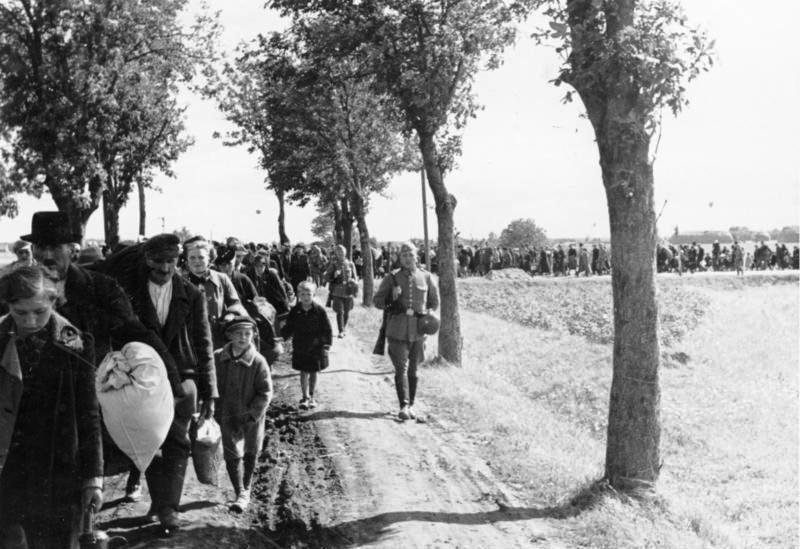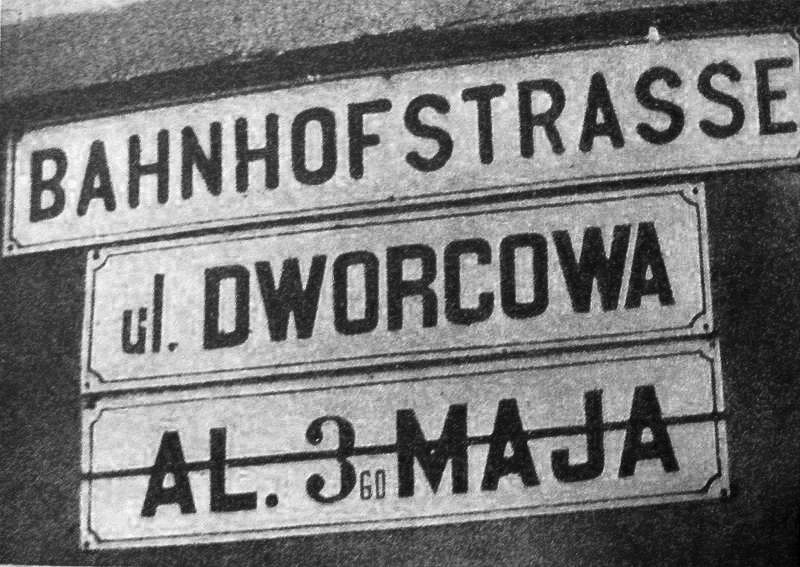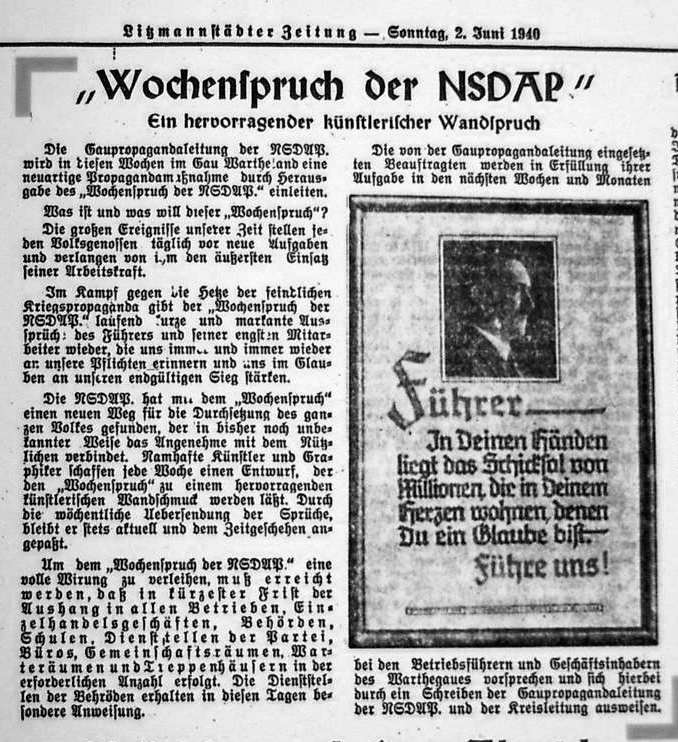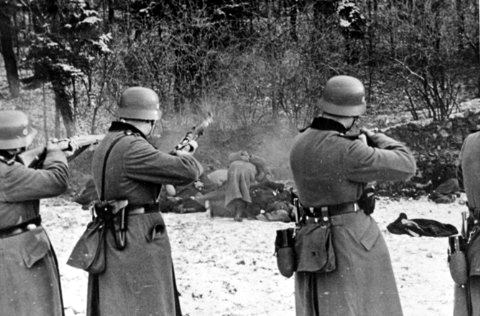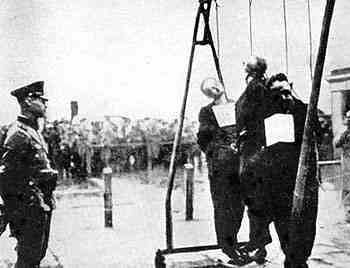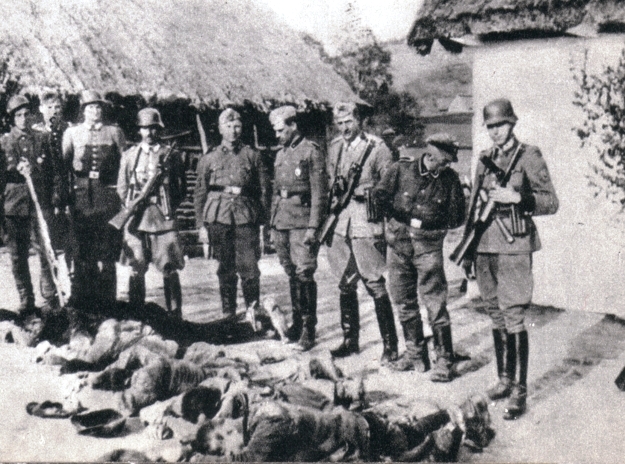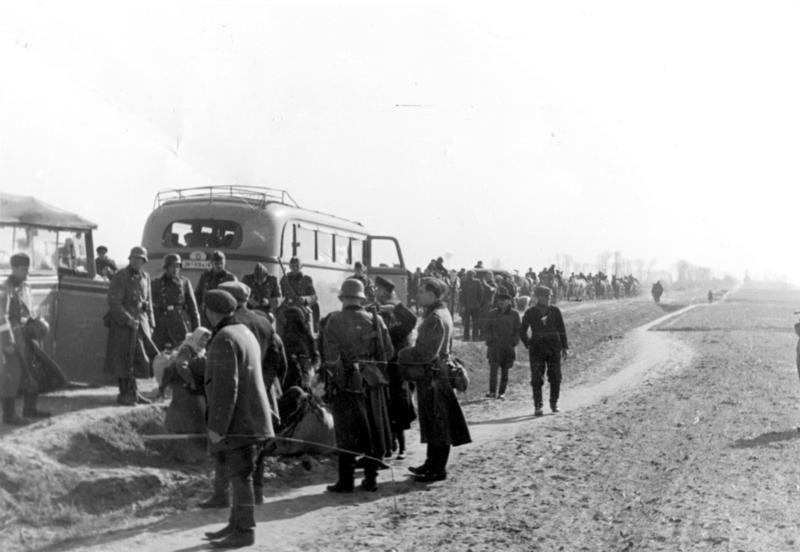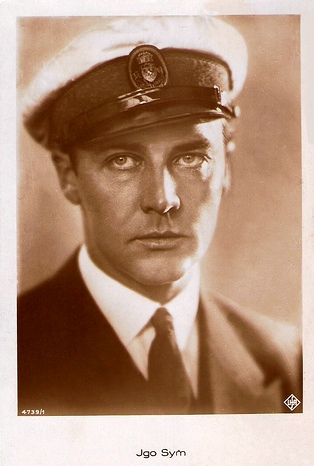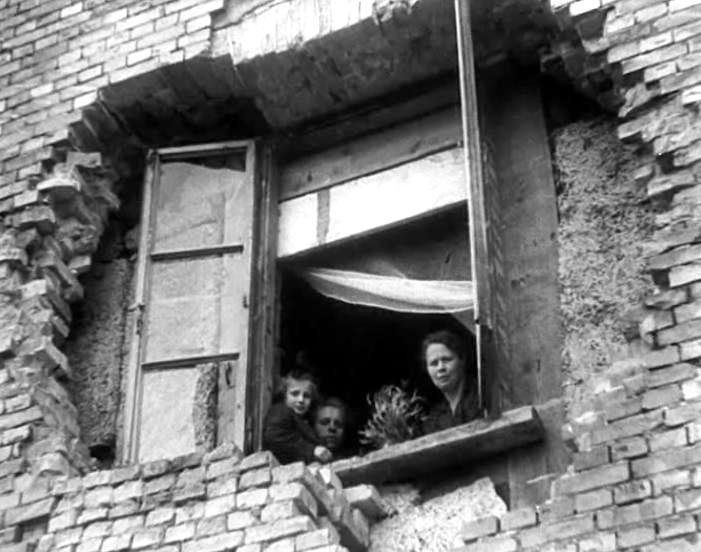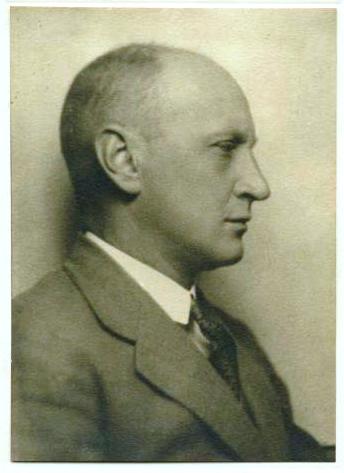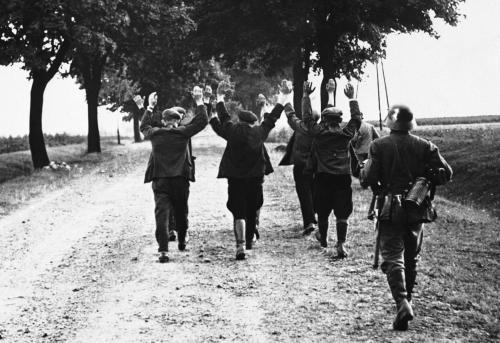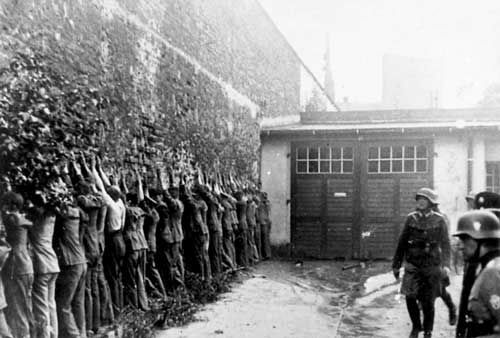Holocaust Education & Archive Research Team |
|
Occupation German Occupation of Europe Timeline
-
[The Occupied Nations]
Poland Austria Belgium Bulgaria Denmark France Germany Greece Hungary Italy Luxembourg The Netherlands Norway Romania Slovakia Soviet Union Sudetenland | ||||||||
POLISH FORT-NIGHTLY REVIEW London, Saturday, November 15th 1941, Issue No. 32 "The Real New Order - Terror " Part 1
Germanizing Activities
There has been no modification in the general tendency to Germanize Polish inhabitants especially of the incorporated areas. Besides the more direct ethnic approach to the question, the German occupant authorities are steadily proceeding with the Germanization of the country by the systematic destruction of everything Polish in the political and economic system, in society, in the family, and even local customs.
German party houses, soldiers' houses, leaders' training schools, children's, homes and nurseries, amusements, celebrations, frequent old pagan German festivals, while Catholic festivals are ignored and religious processions prohibited, all these are exploited as instruments of Germanization.
Germanizing tendencies in the cultural and educational sphere find expression in the opening of German theatres (the one in Poznan was opened by Goebbels himself), German concert halls, as in Cracow, opened by Frank.· and the showing of propaganda films exclusively for Germans.
There are 450 girls spending their vacation in Polish areas, 800 technical students, 630 students sent to S.S. settlement detachments; and 3,000 girls from the bunde deutscher Madel . The Nazi Party has organized 76 agricultural service camps and 26 labor service camps, where a National Socialist programme on approved Reich German lines is carried out.
In addition, in the incorporated areas a policy of direct Germanization is being applied, on the ground that the inhabitants of these areas are either. former Germans, or have German connections, or are living in a German milieu. The legal economic situation of the Germans brought into Polish areas from the Reich has been defined in the words of the leader of the German labor front, Dr. Ley.
When visiting Governor-General Frank in his capacity as Reichsorganizationsleiter, Ley said: The fact that you are German requires that you, should have larger dwellings and greater living possibilities than the Pole or the Jew. By what law? By the law of our blood, the law of self-preservation."
The judiciary, which is organized on the principle of colonial capitulations, removes Germans from the jurisdiction of Polish courts even for the most common of crimes, while the German courts regard such crimes as a kind of heroism.
"We are not like others, who force their way into colonies and foreign countries, plundering them and living on dividends extracted from them, for every German works honestly. The party's job is to arouse idealism, the sense of a certain mission to be fulfilled, in which the basis of existence is to be inspired by self-devotion in service for the Fuhrer."
There are also German illustrated journals, trade and technical journals, and special publications for agriculturalists and the youth. The Ost-Deutscher Beobachter has published in Poznan and the Litzmannstiidter Zeitung in Lodz. The parasitic press is continually discussing problems of settlement, the part played by German colonists in Polish history, attempts to trace Polish names etymologically back to a German origin, etc. And of course everything Polish is sneered at, while the great Polish scientists, and artists, such as Copernicus, Wit Stwosz, Matejko and Moniuko, are given the stamp of Germanism.
Rule of Terror
In the incorporated areas and in the General Gouvernement the German oppression of the Polish people grew even more severe and was applied mare systematically during 1941. The occupant authorities are extending their control over the entire population, resorting to various measures in order to achieve that control. For, instance, several annual categories of young men have been called up to do forced labor in the Polnischer Baudienst (Polish Building Service).
Estimates give the number of such forced laborers as some 70,000, Also the round-ups of both men and women for work in Germany bring large numbers directly under German control. Finally, there is the registration of young people and the enrolment of large sections of the population by the issue of labor cards. In consequence, it is becoming increasingly difficult for people' to escape from the network of controls. In certain of the more densely populated urban areas the German police force has been enlarged and strengthened, especially in Warsaw.
There is universal German terror in the areas incorporated with the Reich. Thousands of Poles are sent every month to prison and to concentration camps; a large number succumb. to the terror and violence. In Poznan the German guillotine accounts for some ninety persons of Polish nationality each month; in January, 92 were thus executed, and in February, 85.
Death sentences are frequent ill other centers also. The persecutions in these areas embrace, all sections of the population, but primarily 'the intellectual classes and the clergy. The people held in the prisons are frequently Inhumanly mal11'eated and torture.
At Poznan a trial was conducted of twenty members of a battalion of Polish National Defense, the 57th Infantry Regiment, and two other Poles, accused of murdering 40 Germans in September, 1939. Thirteen of the accused were condemned to death, including Captain Cichon and Lieutenant Kitka. In March Lieutenant Nieciengiewicz, who had been brought from an officer prisoners of war camp for trial, was· charged in Poznan with killing two German spies in September, 1939, and was beheaded.
Five death sentences and four prison sentences aggregating 34 years were passed on Poles for attacking or attempting to attack a German. Five prison sentences, each of about twelve. months, were passed for listening to foreign broadcasts; six sentences, ranging from six months to two years, were passed for singing the Polish national hymn; and a large number of smaller sentences were passed for even lesser activities against Germans before the outbreak of war and at the beginning of the war and for failure to submit to German economic regulations.
Besides the terrorism to which they are subject in the Polish incorporated areas, Poles are subjected to universal humiliation and are systematically reduced to the role of people deprived of all civic and human rights. There has been a ruthless confiscation of all the large landed estates and industrial, commercial and handicraft enterprises, as well as many medium-sized and small farms and enterprises.
Polish may not bespoken in the streets and public places, nor even at places of work. In. many towns, such as Poznan, the Polish inhabitants are deprived of their homes and are crowded into the poorer class dwellings on the outskirts. They are subjected to malicious restrictions on their food supplies, being granted much lower rations than Germans receive.
They also receive lower wages and salary than Germans, while they are more highly taxed. There are extensive restrictions on their rights to dine in dining rooms and restaurants, and to travel in' trams. Certain articles of food may not be sold to Poles at all, while at Poznan, Lodz and elsewhere they can purchase at shops, only during restricted periods of the day.
In the General Gouvernement the situation in some regards is not so serious as in the Western Provinces. But here also the Polish people are the continual victims of petty 'persecution, torments, and other arbitrary activities on the part of the occupant authorities.
Dozens of the arrested people were shot and the rest are in prisons and concentration camps. In February several' hundred persons were arrested at Lublin, Zamosc, Pulawy and Chelm, and suffered a similar fate. In March some 300 persons were arrested in Warsaw at the time of the Igo Sym affair, seventeen of them being shot: 15 persons were arrested at Lowicz and 300 at Siedlce during the same month. April and May brought further extensive arrests in Warsaw, Cracow, Lublin, Pulawy and a number of other Polish towns. During this year there has been an average of 1,000 arrests monthly in Warsaw.
Many of the people arrested are subjected to torture in the prisons and concentration camps in which they are confined. The arrests and deportations chiefly affect the intellectual classes, who are still being mercilessly crushed, but workers and peasants are also included. A certain proportion of the prisoners are regularly sentenced to death by the Gestapo courts, which consist of two persons. Many of them are tortured during investigation, and the majority are sent to concentration camps. The conditions of existence in the prisons and even more in the concentration camps are unimaginable.
In January:, 1941, there was a spate of' arrests in Warsaw, which died down by the middle of February, though of course sporadic arrests still continued. But at the beginning of March an. event occurred, which led to further wholesale arrests.
On March 7 the actor Igo Sym, who had collaborated with the Germans from the first days of their occupation, was shot in his. home in Mazowiecka street by an unknown assailant. In reprisal, the German authorities immediately ordered the curfew hour to be changed from 11 to 8 p.m., prohibited all public performances for a month, and arrested a large number of hostages, who were to be shot if the name of the assailant was not made known to the German authorities within two days.
These regulations were at once made known publicly through street loud-speakers, the Press,' and by posters. On March 8th arrests were mad~ in various, parts of the city, and all attempts to intervene on behalf of individuals arrested were fruitless.
On that same day white posters were posted up in the city with the wording in Polish and German:
These rumors were later completely confirmed, for seventeen persons who had suffered earlier arrest were shot. They included Professor Kopec, his son Stanislaw, and Professor Zakrzewski. On March 14th proclamations announcing that Dobieslaw Damiecki and Janina Gorska were wanted as suspected of the murder were printed in the Press and posted up in the streets.
It is interesting to note that the change of the curfew hour had been expected and had been foretold by the German authorities before the assassination of Igo Sym. On March 7th and 8th there were arrests of selected persons in various parts of the city. over 200 being taken, though the actual figures were not announced. Among those arrested were a number of doctors, including the staff of the Evangelical Hospital, and eight actors and actresses. A large number were women.
The District Chief Fischer stated that the necessity for drastic repressive steps arose from the fact that nine Germans and collaborators with the Germans had been assassinated in the area under his charge in the course of a week. The placards announcing the shooting of the hostages were not allowed to remain unadorned. During the night all the posters in the City were altered with colored pencil and even rubber stamps, the name Moder being altered to read Mörder, the German for murderer.
In consequence the Germans had to scratch out the signature or paste it over. The walls of Warsaw were also covered with chalked inscriptions, "Oswiecim," and "Remember Oswiecim," just as in December, 1940, the walls had been covered with inscriptions on the anniversary of the Wawer massacre on December 27th, 1939.
On April 5th, 960 prisoners were removed from the Pawiak prison in Warsaw and taken to an unknown destination, probably to Oswiecim. After a brief falling off in arrests, in the middle of May some 28 persons who had been associated with the National Democratic Party ,before the war were arrested in a single day. They included Professor Roman Rybarski, of the Warsaw University and a leader of the party, Professor Staniszkis, Mr. Trajdos and Mr. Siedlaczek.
Arrests were also frequently made 'on the street, for no obvious reason, by Gestapo men in civilian clothes. These people were held in the German police headquarters for a time, though no investigation was made, and were then taken with a number of others in cars to a secret destination. Even then no explanation was forthcoming as to the offences they had committed, nor was the purpose of the journey disclosed. On the other hand, at the end of April some 1,,500 persons, both men and women, were brought to Warsaw and put in the Pawiak prison.
All the prisoners were taken to Skarzysko, where they were kept for some time in the school building. Here, with the aid of rubber truncheons, they were questioned on the subject of the illegal journals now being published in large numbers in Poland. Some of them collapsed under the beatings, but their behavior generally was heroic.
During their confinement in the school they were not allowed to walk about, talk, or even move. The Gestapo employed Ukrainians of the auxiliary police as guards and torturers of the prisoners. After a long stay in the school several dozen were released and the others transferred to Oswiecim. Within a fortnight news began to trickle through that various of the prisoners had died. Among others whose deaths were reported were both the Heydels, apparently on the same day.
The prisoners were first held in Ladzyn, then in Lublin, and later removed to unknown places of incarceration. But not long after news was received that Prince Ludwik Czetwertynski had died in Oranienburg Concentration Camp.
There have .also been many arrests among the Polish population, 86, at one time, chiefly intel1ectuals. Among the hostages taken were all the doctors in the town. The hostages were later ransomed for 120,000 zlotys, collected from the people of the town.
There were many arrests and searches in Lublin and its district during March, and the process has continued since. Some 200 persons were arrested at Janow Lubelski, including the mayor, the majority of the intellectual class, and almost the whole of the Polish police force. Numerous arrests were made among the staff of the Magistracy at Krasnik, and arrests in Hrubieszow county are still continuing, a further twenty persons being arrested at Laszczow recently.
At the beginning of March more than twenty peasants accused of sabotage were shot at Ostroleka. Their bodies were flung into holes and covered with wood, then petrol was poured over and the pyre was set alight. At Skierniewice also a number of young men were arrested, even being hauled out of trains which stopped at the station.
Reports from Wlodawek indicate that there also. arrests are continually, being made, and passers by in the streets are beaten up. And at Kozmin, in Western Poland, numerous arrests followed the killing of two Germans, and fourteen hostages were shot.
* Part 2 of of Issue No. 31 can be read under the title: The Real New Order -Terror #2
Sources:
The National Archives KEW The Chris Webb Archive Public Records Office, London Polish Museum in the United Kingdom Holocaust Historical Society US NARA USHMM
Copyright Carmelo Lisciotto H.E.A.R.T 2010
|
